 Sex. Drugs. Rock n'Roll. Blah, Blah, Blah...Although in comparison to our day, the height of French Decadence hardly seems "Rock n'Roll", every generation has its punk stars and rockers; extremists that stand out with hedonistic and anarchist ways. Oh yes, boys and girls, there was punk before there was Punk.
Sex. Drugs. Rock n'Roll. Blah, Blah, Blah...Although in comparison to our day, the height of French Decadence hardly seems "Rock n'Roll", every generation has its punk stars and rockers; extremists that stand out with hedonistic and anarchist ways. Oh yes, boys and girls, there was punk before there was Punk.
Pink hair, crazy parties, promiscuous, casual sex, drinking, gambling, and a complete disdain for authority. Sounds like a description of any given music star from the late seventies on. I am, however, actually referring to Marie Antoinette...or, since some historians now contest the reputation that history has solidified for her...at least the rumors of Marie Antoinette.
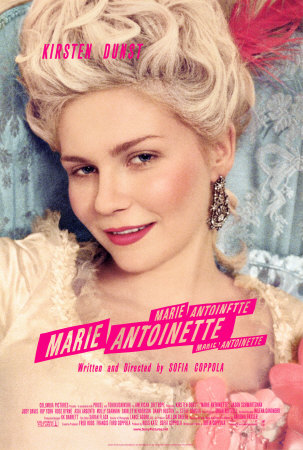 While most would answer "FRENCH!" if asked Ms. 'Toinette's nationality, she was actually born of Austrian blood and married into French court at the age of fourteen. Yes, one...four.....fourteen. Her groom was then sixteen year old Dauphin Louis Auguste (Later to be King Louis XVI) who would fail to consummate their marriage for SEVEN years. What does a teenage girl whose husband is sexually repressed but abundantly wealthy do? She shops. She gambles. She has parties and she flirts. She indulges herself in whatever she can while balancing a disdain for the gossipy French court (not exclusively a French behavior folks...) and maintaining public popularity for herself and, as a result, Austria as a whole. And although she bucks tradition and social expectation, for a good many years this punk-rock girl still manages to stay favorably in the public eye.
While most would answer "FRENCH!" if asked Ms. 'Toinette's nationality, she was actually born of Austrian blood and married into French court at the age of fourteen. Yes, one...four.....fourteen. Her groom was then sixteen year old Dauphin Louis Auguste (Later to be King Louis XVI) who would fail to consummate their marriage for SEVEN years. What does a teenage girl whose husband is sexually repressed but abundantly wealthy do? She shops. She gambles. She has parties and she flirts. She indulges herself in whatever she can while balancing a disdain for the gossipy French court (not exclusively a French behavior folks...) and maintaining public popularity for herself and, as a result, Austria as a whole. And although she bucks tradition and social expectation, for a good many years this punk-rock girl still manages to stay favorably in the public eye.
Then she gambles away the treasury's money, engages in inappropriate (and strictly Austrian) behavior which shames the King, and turns a deaf ear and a blind eye to all those French peasants that she was previously renowned for so benevolently aiding. Marie slips French money to her Austrian brother Emperor Joseph, adulterates herself with Swedish Count Ferson, and conceived at least two of her children with him, had sexual affairs with both men and women, poisoned her own son whom she also sexually molested....or so the French rumor-mills claimed. It is debatable now how much of her reputation was unfavorable gossip (or outright lie and slander) and how much was truth, but truth did culminate in the storming of the palace at Versailles, the King and Queen and their children being taken to prison. Louis was executed, Marie's health failed due to self-imposed starvation, tuberculosis and possibly cancer until she was then also executed at the Guillotines on October 16, 1793.
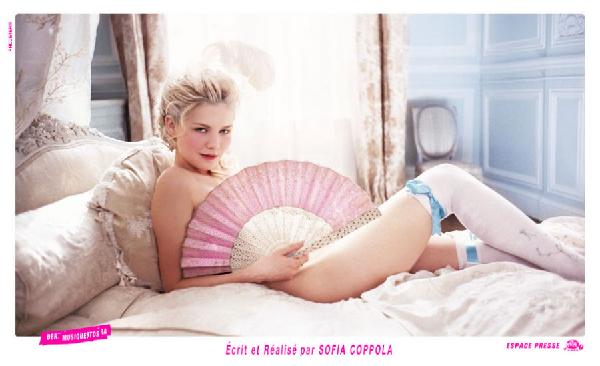 This summary only scratches the surface of a wildly complex woman with a rather scandalous life. Wikipedia manages to delve even deeper. So why then, does a film that uses modern rock music, a movie poster far too reminiscent of a sex pistols album cover, and sporting an American actress not even attempting an Austrian accent fail so MISERABLY at truly conveying just who this young Queen was both in court and in private? It truly plays out as if a better title would have been The Virgin Suicide: 1793.
This summary only scratches the surface of a wildly complex woman with a rather scandalous life. Wikipedia manages to delve even deeper. So why then, does a film that uses modern rock music, a movie poster far too reminiscent of a sex pistols album cover, and sporting an American actress not even attempting an Austrian accent fail so MISERABLY at truly conveying just who this young Queen was both in court and in private? It truly plays out as if a better title would have been The Virgin Suicide: 1793.
Let me tackle my grunts of dissatisfaction one at a time. Music. This, just like the completely ignored accents of Marie and Louis XVI, impresses upon the audience more a sense of laziness and wilted creativity in an attempt to be avante-garde. True creative genius would have been conveying a modern feeling of rock n'roll while staying within the relevant themes of the time period. Sophia Coppola, while a proven director, only manages to continually draw us out of the French Court of Louis XVI and Marie Antoinette over and over with anachronistic lines and soundtracks. This use of modern music in period pieces isn't new, therefore not avante-garde, and did not work any better for me in A Knight's Tale. Inevitably it only dates the film causing it to lose its relevance to "modern audiences" when that "modern" is no longer chic...until, of course, it becomes "retro."
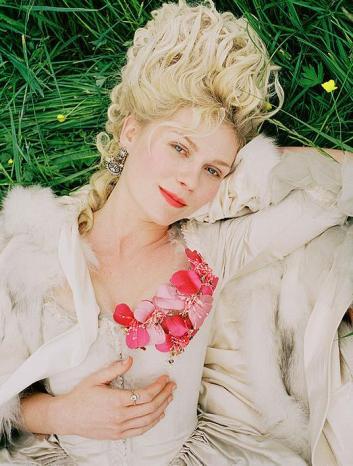 Rock n'roll?? The intensity of this film is more like listening to an old radio that only intermittently picks up a Top 40 Pop station and starts every day with an hour of white noise. This is no critique of the music selections, although those too were lacking. I speak of the passion, the energy, the sense of abandon and rebellion. While the cold handling of Marie's ingress to not only French life and married life, but the socially challenging politics of the French Court, would have been over-all considered well-done if there was a progressive build of tension which crescendo at some greatly dramatic denouement. What follows instead is a watered down, self-indulgent, wistful play-then-pout session that ultimately lacks the dramatic fire of such a rebellious woman, and pales in scandal to even the weakest of soap operas. The aforementioned Wikipedia article is a more exciting read than this film and wasted far less of my time while giving the added benefit of easy to follow character names. Other than Marie, Louis and the oh-so-sexy Count Ferson, my viewing partner and I resorted to referring to characters by their traits. The red-head chick. The gay guy. The Ambassador of Mercy guy. The King's whore. Etcetera.
Rock n'roll?? The intensity of this film is more like listening to an old radio that only intermittently picks up a Top 40 Pop station and starts every day with an hour of white noise. This is no critique of the music selections, although those too were lacking. I speak of the passion, the energy, the sense of abandon and rebellion. While the cold handling of Marie's ingress to not only French life and married life, but the socially challenging politics of the French Court, would have been over-all considered well-done if there was a progressive build of tension which crescendo at some greatly dramatic denouement. What follows instead is a watered down, self-indulgent, wistful play-then-pout session that ultimately lacks the dramatic fire of such a rebellious woman, and pales in scandal to even the weakest of soap operas. The aforementioned Wikipedia article is a more exciting read than this film and wasted far less of my time while giving the added benefit of easy to follow character names. Other than Marie, Louis and the oh-so-sexy Count Ferson, my viewing partner and I resorted to referring to characters by their traits. The red-head chick. The gay guy. The Ambassador of Mercy guy. The King's whore. Etcetera.
 The lack of character identification is a key indication of the lack-lustre performances of the cast. How one could collect such a brilliant group of people and fail to succeed is a mystery. Kirsten Dunst has only a handful of scenes in which she truly shines, most of which when she is NOT speaking. Danny Houston's appearances are sparse and far too brief. Rip Torn, Jason Schwartzman, Asia Argento, and an almost awkward insertion of Molly Shannon all fall short of inspiration. With such talented people, the question falls to material, direction or simply waning interest? Indeed, about the only emotion that Kirsten Dunst brings across quite clearly is deep frustration.
The lack of character identification is a key indication of the lack-lustre performances of the cast. How one could collect such a brilliant group of people and fail to succeed is a mystery. Kirsten Dunst has only a handful of scenes in which she truly shines, most of which when she is NOT speaking. Danny Houston's appearances are sparse and far too brief. Rip Torn, Jason Schwartzman, Asia Argento, and an almost awkward insertion of Molly Shannon all fall short of inspiration. With such talented people, the question falls to material, direction or simply waning interest? Indeed, about the only emotion that Kirsten Dunst brings across quite clearly is deep frustration.
I identified completely.
The greatest tragedy of this film is that it fails to even portray the greatest tragedy of this woman's life! The French Revolution, for what it was, proved to be like any political uprising. Bloody and chaotic. Any war-induced governmental shift will result in the loss of lives and a string of political scape-goats waved to appease the masses and bolster favor for the new leaders. Marie Antoinette and Louis were exactly that. The absolutely outrageous accusations made against the woman during her two-day trial were SO harsh that even the very people who had stormed Versailles craving her blood fell on the side of sympathy for her. Ultimately, however, as history scripts, she was executed.
Sophia Coppolla's insipid biopic of the Queen went far past sympathetic to being completely uninspired and unsatisfying for its audience. One reviewer on IMDB so perfectly likened the film to "a movie about the Titanic that stops short of the sinking and all that nasty death at the end." And I think that description is more than adequate. While Sophia's other films, Virgin Suicides, Lost in Translation are hailed for their under-stated delivery, and rightly so, Marie Antoinette was a woman of excesses in a time of decadence, understatedness seems an almost absurd tact to attempt and the tale falls more in line with her whimsical "woe-to-be-a-girl" films such as Lick a Star and Bed, Bath and Beyond.
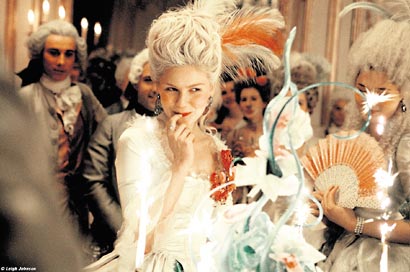 While I try to commit myself to any film I watch, seeing it through to the end just as one would look at every corner of a painting before deciding it was crap...I admittedly only continued to watch this film for the sake of my viewing partner who had far more interest than I...and because I really wanted to see some fucking blood and a head roll by the end of the movie. It would have at least vindicated some of the two-hours spent gaping at the poorly researched presentation of a historical figure's life in the cinematic equivalent of paper dolls. No one in this film struck me as a three-dimensional human....just pretty paper dolls dressed up as the roles of a little girl's fantasy in which no one understands her, no one loves her, and she just wants to have fun. If written by a 15 year old, this film may seem insightful and mature. For a thirty-six year old writer and director, however, it is self-indulgent and vapid.
While I try to commit myself to any film I watch, seeing it through to the end just as one would look at every corner of a painting before deciding it was crap...I admittedly only continued to watch this film for the sake of my viewing partner who had far more interest than I...and because I really wanted to see some fucking blood and a head roll by the end of the movie. It would have at least vindicated some of the two-hours spent gaping at the poorly researched presentation of a historical figure's life in the cinematic equivalent of paper dolls. No one in this film struck me as a three-dimensional human....just pretty paper dolls dressed up as the roles of a little girl's fantasy in which no one understands her, no one loves her, and she just wants to have fun. If written by a 15 year old, this film may seem insightful and mature. For a thirty-six year old writer and director, however, it is self-indulgent and vapid.
When one considers that at thirty-eight years old, the real Marie Antoinette had lost everything dear to her, including her head, the film does nothing to convince us that this was a great loss to France or Humankind. With one snip of my scissors...this two-dimensional Marie Antoinette loses its head. The charge? Failure to perform.

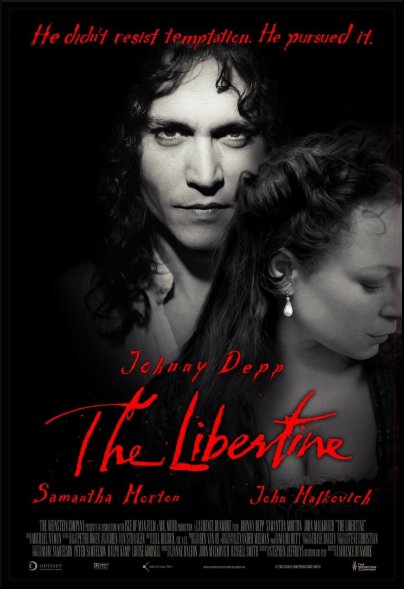
"I don't mean to upset people, but I must speak my mind. For what's in my mind is far more interesting than what's outside my mind."
Arrogant words to be certain, spoke by an arrogant and defiant young man. There is much debate among those who know of the man John Wilmot; scholars mostly for, truthfully, who else cares about a more than two centuries dead poet, pornographer and satirist? The debate boils down to not IF he was a genius, for facts abound to verify that he was, but if he WASTED his genius. I say the answer to that depends entirely upon what the young boy Johnny wanted for his life, for if true Libertinism was his goal then he spent himself well. By every estimation, those who saw him as a literary genius felt he wasted it upon pornography and the theatre, which to some were synonymous at the time. Those who saw him as a political mind felt he wasted that with his Hedonistic behavior and aggressive actions to appall the Court. Those who would call themselves his friends, as John Wilmot himself would have said he had none, a handful of people who would themselves to him for his rebellious nature and Libertine Genius. Wilmot might have quarreled that they could never admit that they enjoy the company of one so vulgar as he and must hide it behind pseudo-intellectual socio-political movements established so that men might do what comes naturally to men and seem ingeniously amoral because they buck the constraints of an all too ostentatious society.The opinion that Wilmot held of himself, however, is something that seems readily determinable as Highly by a brief review of his work. I think, however, by looking at the man's life and more deeply at his works, what you find, instead is a sad young man, unchallenged, unmotivated and uninspired in much of his life. He never denies his own genius, indeed I think he was inundated by the compliments of others and, feeling unchallenged in the attainment of this lofty title, John behaved instead to the absolute contrary of what his Puritan mother, highly respected, political father and royal admirers expected of him in an attempt to foster the hatred that he felt for himself, and perhaps, in doing this, create the resistance that true genius needs to excel.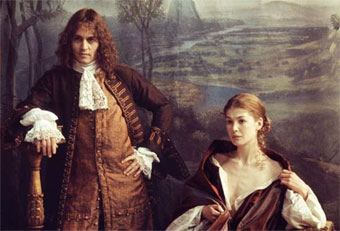 Wilmot's life, though brief at only 33 years, was quite amazing by most standards. Born to a staunchly religious mother and an heavy alcoholic-Military Hero father who spent most of John's childhood in exhile, by the age of twelve, young Johnny had enrolled at The University of Oxford. Yes, that Oxford. At fourteen he received an MA. By the age of seventeen he was deemed a war hero. He married Elizabeth Malett, at age twenty, whom he had unsuccessfully attempted to kidnap at age eighteen. The next thirteen years of his life were a volley game between he and the king, in which he was frequently banished to his country home and his wife and immediately upon reprieve would flee to the city, the theatre and any number of his many mistresses and lovers, including the famous actress Elizabeth Barry. At age twenty-seven he fled the outrage of the king only to impregnate any number of women as a sperm donor under the guise of a fertility doctor "Dr. Bendo," with reputedly grand success. As an Earl, he lived a life of debauchery intermingled with an outspoken and willful life in politics only to die at the age of thirty-three from a far advanced Syphilis, and liver-failure from his drug and alcohol use. And throughout he left an immense impression upon the society of his time, and a remaining body of work that shows his own personal whimsy as well as the eloquence with which he could argue or present any point at parliament. He was as in love with life as he held a hatred for himself and the mockeries of civilization made by mankind. Stephen Jeffreys' opening speech for The Second Earl of Rochester speaks to exactly that. At the start Rochester insists you will not like him, but truth is found in the last line when he states that he does not want you to.
Wilmot's life, though brief at only 33 years, was quite amazing by most standards. Born to a staunchly religious mother and an heavy alcoholic-Military Hero father who spent most of John's childhood in exhile, by the age of twelve, young Johnny had enrolled at The University of Oxford. Yes, that Oxford. At fourteen he received an MA. By the age of seventeen he was deemed a war hero. He married Elizabeth Malett, at age twenty, whom he had unsuccessfully attempted to kidnap at age eighteen. The next thirteen years of his life were a volley game between he and the king, in which he was frequently banished to his country home and his wife and immediately upon reprieve would flee to the city, the theatre and any number of his many mistresses and lovers, including the famous actress Elizabeth Barry. At age twenty-seven he fled the outrage of the king only to impregnate any number of women as a sperm donor under the guise of a fertility doctor "Dr. Bendo," with reputedly grand success. As an Earl, he lived a life of debauchery intermingled with an outspoken and willful life in politics only to die at the age of thirty-three from a far advanced Syphilis, and liver-failure from his drug and alcohol use. And throughout he left an immense impression upon the society of his time, and a remaining body of work that shows his own personal whimsy as well as the eloquence with which he could argue or present any point at parliament. He was as in love with life as he held a hatred for himself and the mockeries of civilization made by mankind. Stephen Jeffreys' opening speech for The Second Earl of Rochester speaks to exactly that. At the start Rochester insists you will not like him, but truth is found in the last line when he states that he does not want you to.
"Allow me to be frank at the commencement. You will not like me. The gentlemen will be envious and the ladies will be repelled. You will not like me now and you will like me a good deal less as we go on. Ladies, an announcement: I am up for it, all the time. That is not a boast or an opinion, it is bone hard medical fact. I put it round you know. And you will watch me putting it round and sigh for it. Don't. It is a deal of trouble for you and you are better off watching and drawing your conclusions from a distance than you would be if I got my tarse up your petticoats. Gentlemen. Do not despair, I am up for that as well. And the same warning applies. Still your cheesy erections till I have had my say. But later when you shag - and later you will shag, I shall expect it of you and I will know if you have let me down - I wish you to shag with my homuncular image rattling in your gonads. Feel how it was for me, how it is for me and ponder. 'Was that shudder the same shudder he sensed? Did he know something more profound? Or is there some wall of wretchedness that we all batter with our heads at that shining, livelong moment. That is it. That is my prologue, nothing in rhyme, no protestations of modesty, you were not expecting that I hope. I am John Wilmot, Second Earl of Rochester and I do not want you to like me."
This is the John Wilmot that was written by Stephen Jeffreys. This is the 'Johnny of the Merry Gang' portrayed brilliantly by Johnny Depp. This brilliantly devised tale that endears a man who stands for everything that our society routinely rejects with an intense level of turmoil and polarizing contrast is not, however, what is depicted by Laurence Dunmore in 2004's The Libertine.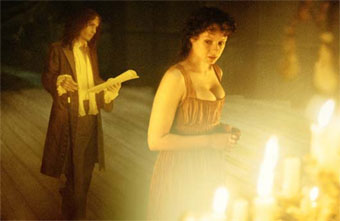 Let me preface the following with a single statement: The Libertine is an excellent film, well worth watching. Visually beautiful, if not so monochrome and drab as to nearly be a gold tinted black and white, and well performed on the part of every actor.Understand, especially if you are American, that this is not an "American" film. Nothing blows up. Very little catches fire. Most of the film depends upon dialog. Oh yes...and you must pay attention. Although the sex scenes are not prudish, nor are they worthy of the pornographic and hedonistic lifestyle of the man they portray. They are, in fact, down right boring. Am I one to watch pornography. No...not really. I view porn as I view sports - something I'd far rather be doing than watching others do. For the purpose of this film, however, the level of sexual and socially vulgar behavior was nothing I would be ashamed to sit beside my grandmother and watch. THAT, is directorial cowardice.In a story about a man who would DARE to write a play for King Charles II to be performed before foreign dignitaries and choses to make it about the King's obsession with cock, let alone produce it - complete with a GIANT phallus upon which actors and actresses ride - this is a man whose story is owed far more than a few mild visual inferences to anal sex and hints at homosexuality so faint your personal fantasies about Johnny Depp or Rupert Friend would completely distract you and the moment would be lost. Again, do I seek pornography? No. Do I think this film may have been done far more justice in the hands of Ang Lee, Sam Mendes or Johnathan Demme? YES.Throughout the film the dialog and the acting is engaging. The presentation is lacking in meek camera work and lazy editing. Although long, uncut segments of film can serve a purpose at times, entire scenes one after the other to go un-cut or only mildly snipped leaves the power of the moments impotent. While on a stage the audience is easily caught up in the energy of the actors, there is a palpable, tangible energy being conveyed. We have only a cold screen before us and it is the director's duty to make sure that the actor's energy conveys and connects to us. In The Libertine that energy and vitality was greatly lacking.Another element that is used to help further the environmental energy is the soundtrack. When you study film, you learn that sound is all important. You can have a crappy visual image so long as the sound is pristine. A perfect experiment would be to send ten people into a room with only one outlet. They have a tv monitor with no speakers or they have a radio/stereo unit. Of the two items, the stereo will almost without question be the item they chose to plug in for entertainment. SOUND is more stimulating. A poor soundtrack or a distracting soundtrack can destroy a movie, just as the perfect soundtrack (i.e. Jaws, Star Wars, Close Encounters of the Third Kind) can solidify a film so deeply in an audience's mind that the sound alone will conjure that film forever.In this, Michael Nyman failed. The Composer has more than seventy-five films to his name. Of them, I can only make claim to having seen The Piano and Gattica. Both were unassuming soundtracks, nothing that stands out, but nothing that destroyed the film either. His compositions for The Libertine were rote, repetitive and overwhelmingly dull. I can say the film may have faired better with no music at all, as the continual recycling of the same refrain over and over grew to be an irritation more than any form of mood bolstering symphony. Harsh? Perhaps...but at nearly two full hours, a film with the same 1 min song on repeat would drive a person insane. In fact, I do believe that is a contemporary torture technique. While this soundtrack is still preferable to anything written by Brittany Spears or Avril Levine, it grated my nerves no less.
Let me preface the following with a single statement: The Libertine is an excellent film, well worth watching. Visually beautiful, if not so monochrome and drab as to nearly be a gold tinted black and white, and well performed on the part of every actor.Understand, especially if you are American, that this is not an "American" film. Nothing blows up. Very little catches fire. Most of the film depends upon dialog. Oh yes...and you must pay attention. Although the sex scenes are not prudish, nor are they worthy of the pornographic and hedonistic lifestyle of the man they portray. They are, in fact, down right boring. Am I one to watch pornography. No...not really. I view porn as I view sports - something I'd far rather be doing than watching others do. For the purpose of this film, however, the level of sexual and socially vulgar behavior was nothing I would be ashamed to sit beside my grandmother and watch. THAT, is directorial cowardice.In a story about a man who would DARE to write a play for King Charles II to be performed before foreign dignitaries and choses to make it about the King's obsession with cock, let alone produce it - complete with a GIANT phallus upon which actors and actresses ride - this is a man whose story is owed far more than a few mild visual inferences to anal sex and hints at homosexuality so faint your personal fantasies about Johnny Depp or Rupert Friend would completely distract you and the moment would be lost. Again, do I seek pornography? No. Do I think this film may have been done far more justice in the hands of Ang Lee, Sam Mendes or Johnathan Demme? YES.Throughout the film the dialog and the acting is engaging. The presentation is lacking in meek camera work and lazy editing. Although long, uncut segments of film can serve a purpose at times, entire scenes one after the other to go un-cut or only mildly snipped leaves the power of the moments impotent. While on a stage the audience is easily caught up in the energy of the actors, there is a palpable, tangible energy being conveyed. We have only a cold screen before us and it is the director's duty to make sure that the actor's energy conveys and connects to us. In The Libertine that energy and vitality was greatly lacking.Another element that is used to help further the environmental energy is the soundtrack. When you study film, you learn that sound is all important. You can have a crappy visual image so long as the sound is pristine. A perfect experiment would be to send ten people into a room with only one outlet. They have a tv monitor with no speakers or they have a radio/stereo unit. Of the two items, the stereo will almost without question be the item they chose to plug in for entertainment. SOUND is more stimulating. A poor soundtrack or a distracting soundtrack can destroy a movie, just as the perfect soundtrack (i.e. Jaws, Star Wars, Close Encounters of the Third Kind) can solidify a film so deeply in an audience's mind that the sound alone will conjure that film forever.In this, Michael Nyman failed. The Composer has more than seventy-five films to his name. Of them, I can only make claim to having seen The Piano and Gattica. Both were unassuming soundtracks, nothing that stands out, but nothing that destroyed the film either. His compositions for The Libertine were rote, repetitive and overwhelmingly dull. I can say the film may have faired better with no music at all, as the continual recycling of the same refrain over and over grew to be an irritation more than any form of mood bolstering symphony. Harsh? Perhaps...but at nearly two full hours, a film with the same 1 min song on repeat would drive a person insane. In fact, I do believe that is a contemporary torture technique. While this soundtrack is still preferable to anything written by Brittany Spears or Avril Levine, it grated my nerves no less.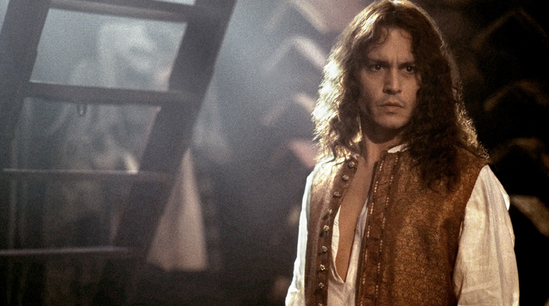 Again, I must say that this is a film worth watching at least once. The value of the performances and the writing well outweigh the misdirection of the overall project. Re-edited with a richer soundtrack and I think this film would be worthy of a menagerie of awards. It was nominated for seven British Academy Awards, of those it won one, and of them they were all earned save, in my opinion, the two nominations for the director. Sorry Laurence, nothing personal; but you have no other films to your name and as a producer, I would be hesitant to give you money. As a graphic designer, commercial and music video director, Lawrence Dunmore's work is not only incredible, but also quite prestigious . He is a member of Ridley Scott Associates, and to me, anything with Scott's name attached is hail-worthy.At the risk of losing my focus, I will leave you with the same lesson exchanged from Wilmot, the Earl of Rochester, to his young new companion, Billy Downs.
Again, I must say that this is a film worth watching at least once. The value of the performances and the writing well outweigh the misdirection of the overall project. Re-edited with a richer soundtrack and I think this film would be worthy of a menagerie of awards. It was nominated for seven British Academy Awards, of those it won one, and of them they were all earned save, in my opinion, the two nominations for the director. Sorry Laurence, nothing personal; but you have no other films to your name and as a producer, I would be hesitant to give you money. As a graphic designer, commercial and music video director, Lawrence Dunmore's work is not only incredible, but also quite prestigious . He is a member of Ridley Scott Associates, and to me, anything with Scott's name attached is hail-worthy.At the risk of losing my focus, I will leave you with the same lesson exchanged from Wilmot, the Earl of Rochester, to his young new companion, Billy Downs.Rochester: And yet you do not draw the moral of the incident.
Billy Downs: Which is?
Rochester: That any experiment of interest in life will be carried out at your own expense. Mark it well.
And so we shall, at 114 minutes expended.
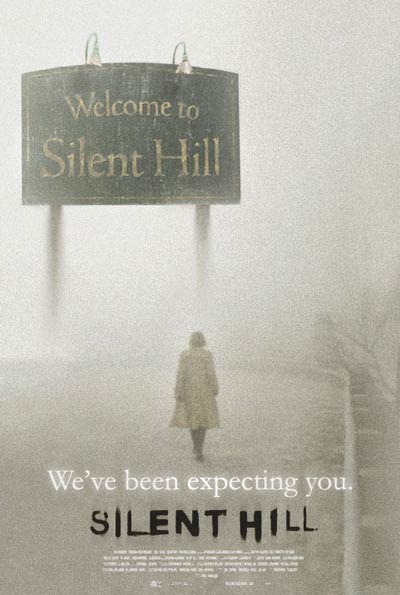 This particular review was written by my best friend. I've interjected a few comments of my own (in orange) as I too saw this film and...well I give her credit for putting so much effort into this. For me, the film wasn't even SO BAD as to warrant my time. Oh Sean Bean, how you sadden me....
This particular review was written by my best friend. I've interjected a few comments of my own (in orange) as I too saw this film and...well I give her credit for putting so much effort into this. For me, the film wasn't even SO BAD as to warrant my time. Oh Sean Bean, how you sadden me....
- - - -
I’m a gamer. Yes, I’ll admit it. I’ll even admit the fact that I’m somewhat of a casual gamer (an insult among gaming circles), not one of these hardcore fanboys (or, girl as the case is) who waits in line for months for the newest gaming platform. But, I enjoy a good game nontheless.
Silent Hill was a very good game.
However, it was a very BAD movie.
Though released in April of 2006 I just saw this movie the other night. I’d heard frightening things about it. Disturbing things from other fans of the horror genre, and I’d put off watching it. I shouldn’t have bothered putting it off. I shouldn’t have bothered WATCHING it to tell you the truth.
Directed by Christophe Gans and written by Roger Avary (Pulp Fiction, Reservoir Dogs), I was most certainly expecting something…more. But apparently, even Avary has days where he drains a few too many tequilas, giggles maniacally at a typewriter, then wakes the next morning to a semi-truck of a hangover going ‘oh my heck, what on EARTH have I done?’. This movie is proof of that.
I must interrupt to point out that Avary did not WRITE Pulp Fiction OR Reservoir Dogs. He is credited with helping to conceive the STORIES of Pulp Fiction and writing the RADIO DIALOG that is featured in Reservoir Dogs. That's it. He's not some secret mastermind behind Tarantino's chair whispering him lines. Less misleading credits would be 1994's Killing Zoe, with Eric Stoltz, and 2002's Rules of Attraction with that Dawson's Creek kid...In all honesty, seeing his name attached (as a co-writer with Neil Gaiman) to the upcoming release of Beowolf curdles my blood, as i was rather looking forward to it and now I'm terrified to see what he's done to a literary classic after seeing how he handled a pop-gore video game movie.
I’m very aware that movies based on video games most often do not work, for numerous reasons. Plots on video games tend to be first person…they include you as an active participant in the storyline so there is a level of immersion not available while simply watching a story. People don’t really expect computer animated beings in a video game to act and make us believe them as much as they expect it of their actor and actress counterparts on the screen. And, if one hasn’t played the video game in question, the movie version tends to feel incomplete and confusing, as most writers and directors seem to bank on the audience at least having a fundamental understanding of what’s going on before the movie even starts.
Such a phenomenon has brought us disasters such as Doom (and Bloodrayne, and Mortal Combat, and Super Mario Bros.) and lukewarm films such as Tomb Raider (and Final Fantasy, which served as more of a novelty than an actual film since most people are hard pressed to recall the plot but quick to remember Donald Sutherland's liver spots). However even knowing this, I was optimistic for Silent Hill. It had the potential to be great. Unfortunately, it did not live up to its potential.
Even for someone who played the game (such as myself) the movie was confusing at best, and the continued actions of the main character that left at least me wondering what the heck she smoked in the 70s did little to salvage it. I found myself utterly unable to sympathize with the heroine and let’s face it…if you can’t sympathize with the protagonist in the story, then what’s the point? (Sheer mockery worked for me...)
The movie opens with Rose (Radha Mitchell) frantically searching for her daughter Sharon (Jodelle Ferland) who it seems has wandered off in the middle of the night. This also, it seems, is not the first time this has happened. Little Sharon has a habit of sleepwalking. Frantically, and in one of the only moments of feeling I actually GOT from the character, Rose searches for her daughter who she finds on a clifftop about to fling herself off. Rose saves her just in time, and Sharon writhes on the ground a bit, locked in her nightmare and screaming about a place called Silent Hill.
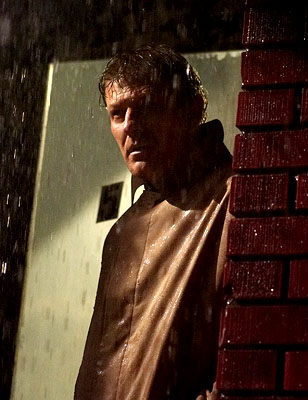 So of course Rose and her husband Christopher (Sean Bean...oh Sean....*sigh*) take her to all the best psychiatrists to find out why their daughter is suffering from horrific nightmares and dangerous sleepwalking.
So of course Rose and her husband Christopher (Sean Bean...oh Sean....*sigh*) take her to all the best psychiatrists to find out why their daughter is suffering from horrific nightmares and dangerous sleepwalking.
No, I’m sorry…that would have made sense. Instead, Rose decides the best way to treat her daughter’s psychological trauma is to take her to this town of her nightmares, Silent Hill. Makes you wonder how she’d treat a bout of the flu. Anyway, this is a real town, abandoned for thirty years due to a coal fire burning beneath it that is releasing toxic gases into the air.
Sounds like a perfect place to bring your child. (Sounds like New Jersey, but was amusingly based on a town in my homestate of Pennsylvania. Go figure.)
Christopher is against this (the Dad is the smartest one and hot) but Rose takes Sharon anyway, packing her in the car and driving off to find this town. Along the way, they stop at a gas station where Sharon discovers her happy crayon drawings have all been altered into nightmarish figures. As she cries about this to her mother, spouting “Mommy? Mommy, who did this??” she draws the attention of motorcycle cop Cybil Bennett (Laurie Holden, best remembered as Marita Covarrubias on X-Files...unless you actually REMEMBER the Father Dowling Mysteries).
With her young daughter (who acts about five or six but we later discover is actually nine years old) frightened and confused, Rose does the understandably maternal thing and leaves her alone in the car in the dark in a strange place and goes inside the gas station market. Naturally. That’s what I would do. She cracked the window!
If I were some sort of psychotic weirdo. (...ahem...?)
While Rose is in the market asking directions to Silent Hill (because Googling directions to the place before leaving would have made sense and she’s not allowed to do that) Cybil the cop approaches the car and starts speaking with Sharon, who spurns her with a quick, “I’m not allowed to talk to strangers” and swiftly shuts herself up in the car. Here, we get a glimpse into Cybil’s kind nature as she responds with an affectionate smile and a ‘good girl’.
Cybil glances around the car. Rose notices. Rose returns to the car and they continue on their way.
Shortly before they reach the turn off for Silent Hill, the cop pulls her over. At first there seems to be no reason for it…but later it is explained that a wacko once kidnapped a boy and took him to Silent Hill to drop him down a mine shaft. Cybil, our cop, was the one who found the boy and stayed with him until rescue came. So, I accept this as a flimsy reason the cop is suspicious of a woman and a girl bearing no physical resemblance to her heading toward Silent Hill, but even so, there was nothing stopping Cybil from confronting Rose at the gas station. Instead she chooses to wait and pulls her off the road. But, as I’m in a generous mood, let’s just assume the cop wanted to be sure first that this lady was heading to Silent Hill and not, say, Disney Land.
At any rate, Rose pulls over but upon seeing a sign indicating Silent Hill, decides that instead of staying and seeing what the cop wants, reassuring her or even downright lying to her, she decides the best course of action is to take off. Apparently Cybil can’t believe she’d do this either, given the way her jaw drops.
But then, Rose is already a nominee for Mother of the Year, why not indulge in a little high speed chase on dark, slick, unpredictable mountain roads with your child in the car and a policewoman in hot pursuit? (Uh...YEAH...I so would.)
Makes sense to me.
And so, long story short, there’s a ghostly figure in the road and Rose wrecks. She doesn’t hit anything that we can see, yet feels the need to smash her face against the steering wheel and go unconscious.
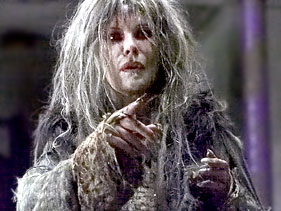 Upon waking, she discovers she’s alone in the car, stopped in the road at the edge of a town wreathed in mist and constantly falling grey ash…symbolic, I suppose, of the burning coal fire under the city. (And a really friggin cool effect that is DIRT Cheap to do.) She sets off into the town to search for the now missing Sharon, giving the impression not of a frantic, terrified mother searching for her child but rather someone seeking out a possession that has simply been misplaced. This attitude is revealed later with the almost jealous way she snatches her locket back from Daliah (Deborah Kara Unger...She was in The Salton Sea--you must see it.), a grey haired hag-lady who mistakes the image of Sharon for her own child.
Upon waking, she discovers she’s alone in the car, stopped in the road at the edge of a town wreathed in mist and constantly falling grey ash…symbolic, I suppose, of the burning coal fire under the city. (And a really friggin cool effect that is DIRT Cheap to do.) She sets off into the town to search for the now missing Sharon, giving the impression not of a frantic, terrified mother searching for her child but rather someone seeking out a possession that has simply been misplaced. This attitude is revealed later with the almost jealous way she snatches her locket back from Daliah (Deborah Kara Unger...She was in The Salton Sea--you must see it.), a grey haired hag-lady who mistakes the image of Sharon for her own child.
Very shortly into Rose’s search she discovers the town is not nearly what it seems to be, as she’s attacked by the Smoke Children, who look like sculptures of babies made out of burning cigarette ash. Inexplicably the Children vanish and her first reaction is not to promptly find a weapon, a phone, or ‘get the hell out of Dodge’ but to figuratively shrug her shoulders and go wandering about, drawing attention to herself by yelling for her daughter.
Eventually we learn that Cybil, the cop, is also in Silent Hill. She has fouled her bike and as a result, is in an equally foul mood. Rose has returned to her car, discovering an angrily drawn demonic picture labeled with a ‘school’…and by that, determines that her daughter must be there. (Naturally...the whole movie is like watching a friend play a quest game - "Oh look! A key! Pick it up, maybe you'll need it!") Cybil finds her, confronts her, and arrests her, determined to march this crazy lady back down the road by foot if she must. Instead, they find the road is simply gone, and we have our first…and only…encounter with the Lying Men.
Now, I liked Cybil. She was the only character which, in my mind, made anything watchable about this movie (You forgot Sean...Oh, Sean...*sigh*). But even I had to gape in startlement when, seeing a deformed, armless, faceless creature with a big acid-spitting hole in its chest, her first reaction is to tell it to halt as if it was a looter scooting out of a Best Buy with a stolen VCR. I’m sorry, but if I saw one of those things walking toward me, my reactions would be three-fold. Scream, shoot, and wet myself. Not necessarily in any order and most likely simultaneously. Instead, Cybil orders it repeatedly to halt, and waits for it to get into spitting range before opening fire. As a result, she gets acid spit on her and ends up having to shed her helmet, glasses, and nice leather jacket. Oddly enough, none of this acid got on her face…apparently, the Lying Man is a picky shot. (Cybil's blonde...blondes don't get fucked up in these movies, only brunettes. Pay attention Becky!)
Rose of course takes full advantage of this confrontation to run. Yeah, you read that right. Run. Away from her only ally. Away from the person holding a gun. WITH her hands handcuffed. Oh, and Cybil’s got the keys to those, too.
I was chanting at her to die at this point. The character was just becoming painful. (Well, she DID hit her head....)
So Rose wanders around town for the next ten or twenty minutes with her hands cuffed, seeking out inexplicable clues to where Sharon might have gone. On a side note, doesn’t it seem odd that a small coal mining town has a huge elementary school, a multi-level hotel, and a six floor hospital? Hmm…
Rose tries the school where she discovers a huge ring of various sized keys. Rose stays in character by trying the keys on a variety of drawers, lockers, and doorways instead of, oh, I don’t know, finding one small enough to undo her cuffs. She also finds a flash light that, despite having sat in a otherworldly limbo for thirty odd years, still has working batteries. Go Duracel!
Rose is now chasing a childlike figure that keeps darting around corners and up stairways. She thinks this is her daughter. I think she should be wondering why Sharon would continuously run away from her. I mean, a child in a scary place like that…wouldn’t they run TOWARD their parents? Then again…if Rose was my mother I’d probably run from her too. Amen.
Each time she chases this child, Rose ends up in some mess with gross things happening. So naturally, when the child runs into a restroom Rose’s natural inclination is to peek in stalls.
Does no one but me think this is a bad idea? The room is a dead end. The kid has to come out sometime. Why open yourself up to a faceful of raw sewage or a dirty pipe monster?
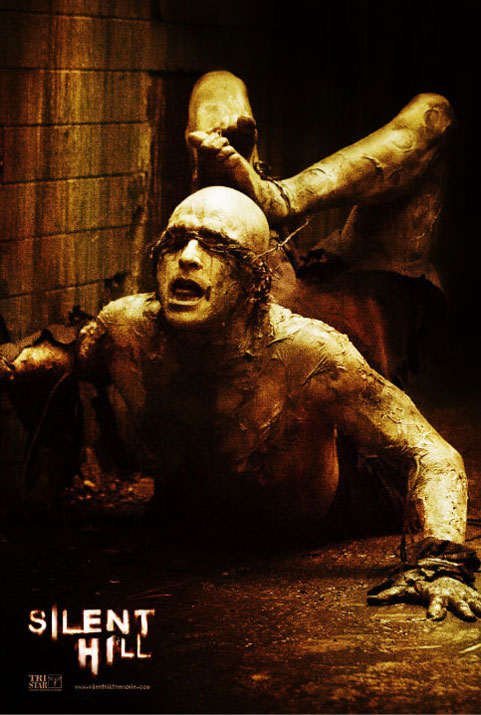 No raw sewage monster. Instead, she discovers a grotesquely bent body tied up with barbed wire and eviscerated. (So fucking sweet people...you gotta see it. This guy does backbends my Yogi can't do). She then decides to turn off her only light and put down her only weapon (given all that’s happened, she oddly doesn’t seem concerned with arming herself, not even with a stick or bludgeon of some kind) and go poking around in the corpse’s mouth. There she finds a bit of wood from a nearby hotel. Of course, this must mean that Sharon went to the hotel, rather than the fact that this guy must have choked to death after indulging in a weird fetish having to do with barbed-wire bondage and pica. (Pica is an abnormal appetite for earth and other non-foods...yeah, I had to look it up. Bite me.)
No raw sewage monster. Instead, she discovers a grotesquely bent body tied up with barbed wire and eviscerated. (So fucking sweet people...you gotta see it. This guy does backbends my Yogi can't do). She then decides to turn off her only light and put down her only weapon (given all that’s happened, she oddly doesn’t seem concerned with arming herself, not even with a stick or bludgeon of some kind) and go poking around in the corpse’s mouth. There she finds a bit of wood from a nearby hotel. Of course, this must mean that Sharon went to the hotel, rather than the fact that this guy must have choked to death after indulging in a weird fetish having to do with barbed-wire bondage and pica. (Pica is an abnormal appetite for earth and other non-foods...yeah, I had to look it up. Bite me.)
Eventually we learn some things. Firstly, that whenever the town’s warning siren sounds, the walls peel, metal rots, and icky things start happening. Rose runs away from these, gapes at them, or watches them in almost dispassionate, detached interest. She does eventually arm herself almost idly with a butter knife she later uses to attack…a painting. Because there has to be a door back there. Duh.
Cybil finds her and shows the only real true human reaction to what’s happening by freaking out and screaming ‘what the fuck is going on’ in a way that made me want to cheer. Finally, some ACTING. Cybil then oddly decides to protect Rose and help her out, rather than…oh, I don’t know, bludgeoning her unconscious while screaming ‘what the hell possessed you to drag me here you stupid bint??’
They find a girl named Anna who apparently lives in the town along with a group of cultists. This strikes neither Cybil nor Rose as odd, because deserted, poisonous towns always have occupants.
Some exposition is given, Rose arms herself, the siren goes off and they all run toward the only place that would not be touched by evil…the church. Even though the darkness is coming and the town is falling and rotting away behind them, Rose decides the church steps are a good place to hold a conversation. And oddly enough, Cybil doesn’t scream ‘f-you’ and run inside herself, but indulges this conversation. I liked Cybil, but at this point I’d have knocked them both on their butts in my haste to get inside.
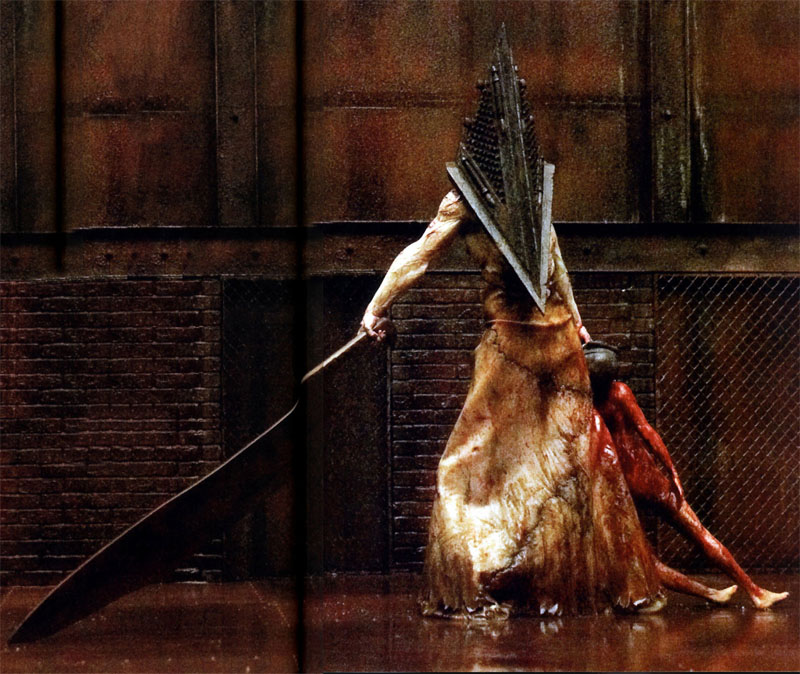 Sadly, Rose did not die, but Anna does at the hands of Pyramid Head. Who, by the way, is a major villain in the games but in the movie only makes two cameo appearances that do nothing for his character. It’s like watching a version of the Lion, Witch, and the Wardrobe where the White Witch just wanders on screen a moment, waves, and leaves again, never to be seen more. He deserves his own fucking movie. He has the potential for creepiness that the Pale man of Pan's Labyrinth epitomized.
Sadly, Rose did not die, but Anna does at the hands of Pyramid Head. Who, by the way, is a major villain in the games but in the movie only makes two cameo appearances that do nothing for his character. It’s like watching a version of the Lion, Witch, and the Wardrobe where the White Witch just wanders on screen a moment, waves, and leaves again, never to be seen more. He deserves his own fucking movie. He has the potential for creepiness that the Pale man of Pan's Labyrinth epitomized.
There’s another attempt at exposition. I’m distracted at this point watching Christabella (Alice Krige) and yelling ‘resistance is futile, you shall be assimilated!’ Her acting was impeccable as always, but then, she always did well at megalomaniac cultist leaders. (She was in Barfly, written by Charles Bukowski...kick ass movie with Mickey Rourke and Faye Dunaway-a goddess)
They go to the hospital to confront the beast. On the way, Cybil tells Rose that Sharon is ‘lucky to have a mother like you’. Yeah, the way the Germanic Jews were ‘lucky’ to have Hitler. It’s small wonder to me now why Sharon was trying to pitch herself off a cliff in the beginning of the movie. You would too if you were stuck under Rose’s care.
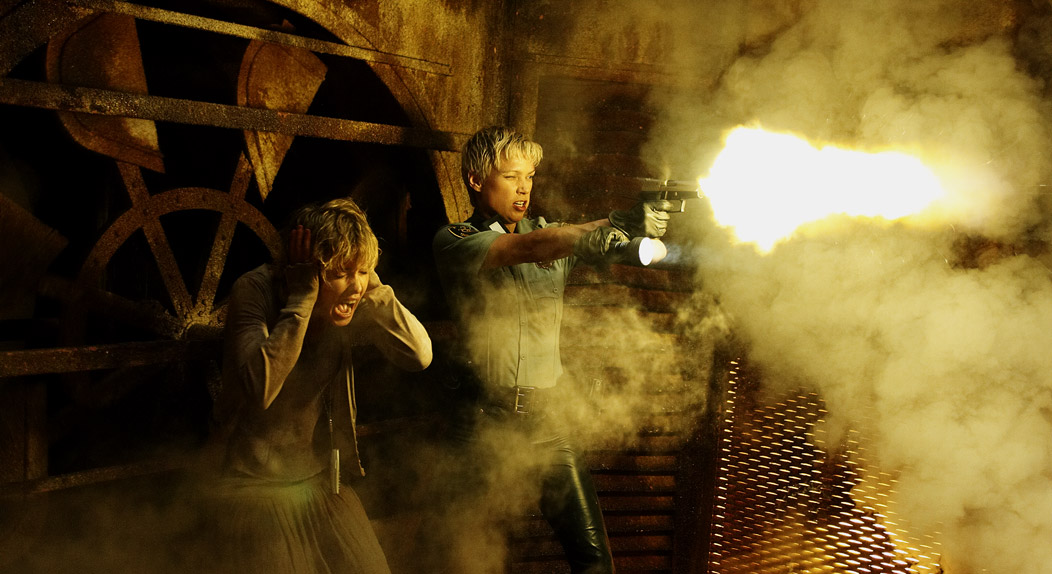 At the hospital there is a confrontation. Cybil shoves Rose into the elevator after killing one of the cultists and tells her to find her daughter. Even though there is plenty of time to enter the elevator with her, she doesn’t do this for some strange reason. For an even stranger reason, as soon as the elevator departs, Cybil puts down her weapons and seems to submit herself to what we used to call ‘a major ass-kicking’ by the cultists. I’m thinking at this point she’d rather just die than continue to be in the movie. ( 'OO-RAH Sistah!)
At the hospital there is a confrontation. Cybil shoves Rose into the elevator after killing one of the cultists and tells her to find her daughter. Even though there is plenty of time to enter the elevator with her, she doesn’t do this for some strange reason. For an even stranger reason, as soon as the elevator departs, Cybil puts down her weapons and seems to submit herself to what we used to call ‘a major ass-kicking’ by the cultists. I’m thinking at this point she’d rather just die than continue to be in the movie. ( 'OO-RAH Sistah!)
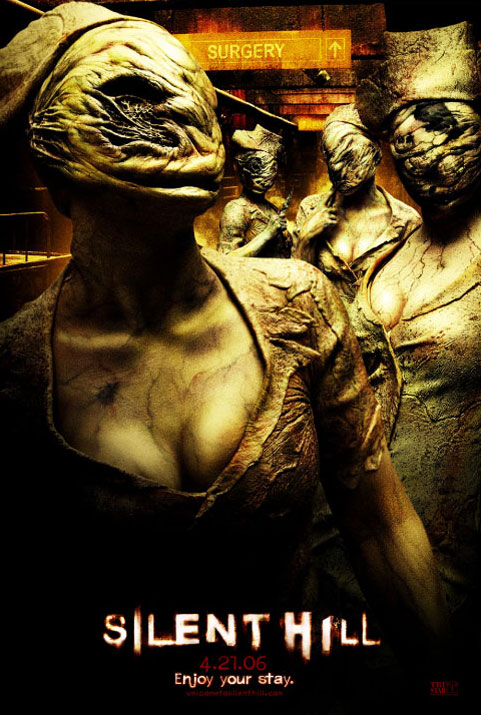 After running a gauntlet of blind nurses that seem unable to walk yet are meant to be terrifying (they can’t see you or chase you! Ooh, spooky - yet oh so buxom and sleazy) Rose finds the truth of the goings on. At least, I think it’s the truth. A young girl was terribly treated and eventually torn from her mother and burned alive for being ‘a sin’, the cop helping the father to try and locate his nutso wife and daughter is shown rescuing her though oddly enough, he hasn’t aged at all in thirty years, and this all comes down to the fact that this kid is really uber-pissed and wants revenge, and Sharon is all the ‘good’ that had been left in her, abandoned on an orphanage doorstep. Apparently, since Sharon is only nine (and acts three) and since Alessa was burned thirty years ago, it took her twenty-one years to spew out the good. But, whatever. I’ve learned not to ask.
After running a gauntlet of blind nurses that seem unable to walk yet are meant to be terrifying (they can’t see you or chase you! Ooh, spooky - yet oh so buxom and sleazy) Rose finds the truth of the goings on. At least, I think it’s the truth. A young girl was terribly treated and eventually torn from her mother and burned alive for being ‘a sin’, the cop helping the father to try and locate his nutso wife and daughter is shown rescuing her though oddly enough, he hasn’t aged at all in thirty years, and this all comes down to the fact that this kid is really uber-pissed and wants revenge, and Sharon is all the ‘good’ that had been left in her, abandoned on an orphanage doorstep. Apparently, since Sharon is only nine (and acts three) and since Alessa was burned thirty years ago, it took her twenty-one years to spew out the good. But, whatever. I’ve learned not to ask.
We then have a prolonged climax in which the cultists burned the only character even somewhat worth anything alive (Cybil, I was mad), plan on burning Sharon alive, and instead get their come-uppance when burned chick enters and tears them all apart.
Ok, no...you cannot skim over this part. Spoilers be damned. We are talking giant tentacles of barbed wire that lash out and rip people into pieces, or impale them and leave them hanging in mangly meaty bits from the cathedral ceilings of the church. And then- like a live action, sadist's version of The Brave Little Toaster, Dark Alessa rises up from the bowels of the church- IN HER BED -barbed wire tentacles waving frantically to impale Christabella - not through the torso or head....through the GROIN...VERTICALLY. Seriously the entire movie is a waste of time except watching that three minute cinematic perversion. It isn't Bruce Campbell spewing worms and entrails in her face but...its up there.
Now, while all this pointless running around on Rose’s part is going on, her husband and a town cop are searching the ‘real’ Silent Hill trying to find his wife and daughter. Their car and Cybil’s motorcycle have been discovered abandoned but there is no sign of them. It is through Officer Thomas Gucci’s (Kim Coates) exposition that we learn of Cybil and the boy that was dropped down the mine shaft. After Christopher breaks into an orphanage and hall of records, Gucci displays his burned hands. We learned these were caused when he carried the horribly burned but still living Alessa to the ambulance, despite the fact he looks not a single hour older than he did then, despite the fact thirty years have gone by. Ah, if only I could age so well. I’d still look two years old.
After the death of Christabella and her cult, Rose and Sharon are allowed to leave Silent Hill, but not before Rose first gets to toss off the line ‘To a child, Mother is God’ to Daliah, as an explanation as to why Alessa didn’t kill her as well (and a complete rip off of The Crow). The words themselves as well as her attitude when saying them once more suggest that she views Sharon not as a mother should view a child, but as a possession, something that belongs to her, and worships her utterly as a pet might worship an owner. Never do you feel a true mother-child bond between the two of them…at least, I did not. When Sharon is in immediate danger of being burned alive Rose’s vehemence is almost identical to that a person would show when someone is threatening to kick in the corner panel of their new car, or pitch a rock through their plate glass living room window.
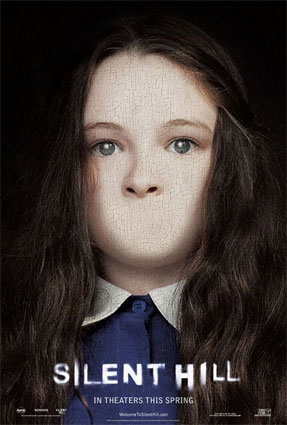
I started this movie with the anticipation that it would at least be interesting and left with only the feeling that I was glad Rose wasn’t my mother, and how on earth could I get my money back, even though the movie was free.
Silent Hill should have remained silent.
The previews flashed rapid, action-packed images of a vigilante killer; a woman fed-up and fighting back. They portrayed a story that glamorized violence because it was justified, for a cause. Set to exciting music with awesome graphics and Jodi Foster's sexy, svelte 40-something body, the trailers sold us a story that boasted all the worst ideas that a young woman could take from words like "Empowerment" and "Reclaiming Oneself" and "Bravery." To me, the previews were the ultimate in "trailer trash," because they didn't sell you the story- they sold ideas that the money men thought would hook an audience in and sell seats. They sold bullshit.
My fiance's cousin wanted to go see this movie called "The Brave one." I'd seen all the previews and was loathe of the very idea of seeing it- for what the previews claimed it was. So me, being the Reigning Goddess of Research ...decided to hunt down the script and read THAT first. So yes, I admit, I screened a movie for a 20 yr old woman as if screening Transformers for an 8 yr old, but with good cause. Not that I am some sage old woman, but at twenty I was still very much formulating my ideas of what it was to BE a woman. Hell, I still have soft-spots that need solidity; and not that I imagine she looks up to me as some kind of role-model, but I did not want to advocate an idea that I do not believe in by showing support and paying for her ticket. Call it an ineffectual liberal-esque protest, but that was simply my point of view.
The script I read moved me. What I found in the story was a woman- not hell-bent on murdering men or even scum-bag men- but rather a woman who struggles with how to survive when she already feels dead. Overly poetic? Perhaps, but wholly true. Ever step this woman makes is part of a progression, one that- in the director's perspective- has an ultimate end, an unavoidable end. Reborn of fear, this woman- losing her fiance to a senseless act of violence and herself being beaten nearly to death- takes a step, which many are led to believe is a logical act toward protection: she buys a gun. Having that weapon gives her a sense of security and yet, when first she uses it- in desperation- and she does take the life of another human being, she does not feel proud or vindicated or even justified. She is horrified by what she has done, yet the fear persists. This event only solidifies in her mind the NEED for that protection. If she hadn't had it, she would be dead. This is how the progression begins, and with each act her detachment from these men as Human Beings becomes less and less, making her decision to act easier and easier. Yet the woman's rational mind knows that what she does is wrong, it is her fear that compels her. She feels that she must do this, she must complete this progression of violence that was begun or she cannot rest. She must see it through to the inevitable end.
I have read so many reviews of this film that my head is filled with the trite, quippy dismissals that are regurgitated in one after the other. I do not know what critic or journalist was the first to make a comparison to 1974's Death Wish with Charles Bronson but every wanna-be hack writer since can take their tongue out of his/her ass and learn to think for themselves. The similarities are strained at best and if someone wants to make a comparison to another film, let's try something more relevant...and recent. Why not this year's Death Sentence with Kevin Bacon which comes complete with the "sympathetic Homicide Detective" and a gentle, mild-mannered vigilante protagonist pushed to the strained limits of their abilities to cope. Let us be honest people...we are hard-pressed to ever see any role played by Charles Bronson as anything other than a bad ass with a gun. I think it highly unlikely that we'll be seeing The Brave One V: The Face of Death coming out anytime soon. See, I can use IMDb too - only I've actually seen Death Wish and I'm not just relying on the one paragraph, poorly written synopsis. The Brave one has something that Death Wish lacks severely: credibility.
Every reviewer who walked into this film and came out to write that it was some "Girl-power" feminist version of Death Wish either didn't watch the movie and instead was the asshole sitting two rows in front of me with his lap top open and his cell phone on, or walked in already bound and determined to hate the film. And why not, it has Jodie Foster, one of the greatest threats to the good ol' boys: An intelligent, deliberate, and powerful woman. I dare you to find anything that qualifies as a "fluff film" on her resume after she turned sixteen. What appalled me when seeing the previews was the idea that the woman who so powerfully portrayed Sarah Tobias in The Accused would participate in a film that looked on the surface to be so painfully shallow and misguided. I should have trusted her judgment and never questioned the script. A Valedictorian of her French-speaking prep-school and magna cum laude of Yale, this woman wouldn't make such a senseless and irresponsible film as the one being advertised. Therein was the key. She didn't. And it is those who draw comparisons to films that senselessly glorify violence and revenge...like Death Wish...that perpetuate the false peddlings of the trailers for this film.
Jodie Foster does not carry this film alone, however, and I must speak out for Terrence Howard. His character is powerful in that he represents the conscience of the film and of Foster's character Erica Bain. As Erica and Det. Mercer develop a friendship it is his rational voice that acts as the only thing grounding her in the reality of the now and not allowing her to recede so far into the dark of her grief and fear that she is lost completely. Lesser actors may have portrayed Mercer as a straight up Clark Kent-type, so clean and innocent of mind that he has to be from another planet. Howard finds an excellent balance of idealism, soul-weariness and a legal means to be The Punisher. There is no doubt, when watching the Detective that he is driven toward ensuring that bad people pay their toll and it is when the question is posed to him of which is better, which is right and more effective- the legal system...or any means necessary, it is then that we truly see Terrence Howard shine as he is divided within himself.
The idea of justice is one that has for centuries weighed heavily on civilized cultures. The question is not only what is the most effective- eye for an eye, life for a life- but also what is RIGHT. And what is right? Do you know? I don't know that I do. I'm certain that our society as a whole has no real clue. One of the biggest fallacies in the promotion of this film is the description of Foster's character as a Vigilante. A vigilante is "one who takes the law into one's own hands." That is not where this journey begins for Erica Bain. She doesn't leave the hospital after being brutally beaten and decide she is going to kill evil men. What Erica's journey is lies more in the realms of self discovery. Do not scoff, I'm quite serious. In buying that gun, she did not make a conscious decision that she was going to kill people.
The gun has become a symbol in our country (ours especially) of security. Policemen have guns and they protect. Security guards have guns, their very name suggesting their purpose. Our military carry guns and they have been elevated to a status of sainthood in America. We have our right to bear arms - to protect ourselves. Its as if the idea that bad men carry guns died out with the advent of film, when cowboys with guns became the new heroes, and anti-heroes like Dirty Harry redefined our society's concept of cool. The more guns you have the more bad ass and indestructible you are. Look at our pop-culture icons. Neo in the Matrix...he had a fuck of a lot of guns.
So this is where her journey starts with this need for protection, to not feel afraid, to not feel vulnerable and weak....it isn't with the notion that she intends to kill anyone. The first time she uses it she is defending herself and had she stayed at the scene, the worst she would have suffered was likely a charge for carrying an unregistered weapon without a license. But Erica was still overcome by her fear...and now there is new turmoil because she broke the biggest taboo of human nature: she killed another human being. Each step along the path that she takes, Erica sheds more and more of her fear, but what she finds through Det. Mercer's friendship and counsel is that she is also shedding pieces of Erica Bain. He asks her at one point, when someone has suffered what she has, how do they cope and then carry on. Her reply is poignant to Erica's struggle.
"You don't. You become someone else."
Anyone who has experienced any sort of violent crime can identify with the passage that Erica must make. To cope she had to become someone else, and bit by bit the real her was slipping away. A piece dying with each act of violence that she then exacted in turn. Her rational mind, that part of her which was still Erica Bain and was a friend to Det. Mercer, struggled with the questions of justice. Although these victims were violent men, men who left victim after victim in their wake, was it justified to kill them when the legal system seemed incapable of holding them accountable for their crimes? This is truly a question that defines societies as civilized or barbaric. Erica Bain and Detective Mercer held this same question in their hands each representative of one aspect; the civilized and the barbaric. Unsurprisingly the balance between two stark halves grows more and more blurred and the end of this film leaves that question in your hands. What is justice? Is it possible to weigh barbaric acts with a civilized system or must the civilized, at times, act barbarically in order to define justice?
Unfortunately many of us wait to ask ourselves these questions until we are faced with the choice and must act. It is easier to give the weight of the world to another to carry, and lay such decisions on others because to make a decision forces you to be accountable; not just for you and your own actions, but for the ultimate effect they hold over another. Day to day we face struggles which play upon our fears at some level. Our society, with its politics and the media, reflect how much of a grip we have allowed fear to have on us and if you look closely more are dying as a result.
I was given a different definition of 'Vulnerability' at a recent seminar. The speaker explained that Vulnero, in Latin means "to wound", and an 'ability' is the strength or skill to do something; you are able to do it. Vulnerability then is not that you are susceptible to being wounded, that implies weakness. By true definition it is "the ability to be wounded," or more meaningfully, it is that you have the ability to be wounded AND SURVIVE. Vulnerability is proof of ones strength. "The Brave One" does not reference Erica Bain's "ability" to stare down her attackers and to kill them...it references Erica Bain's ability to recognize her fear and to not lose herself to it completely. It shows that she is vulnerable, but not defeated. Bravery is not the act of not being afraid, it is the perseverance of being afraid but going forward anyway.
"I always believed that fear belonged to other people. Weaker people. It never touched me. And then it did. And when it touches you, you know... that it's been there all along. Waiting beneath the surfaces of everything you loved." ~Erica Bain
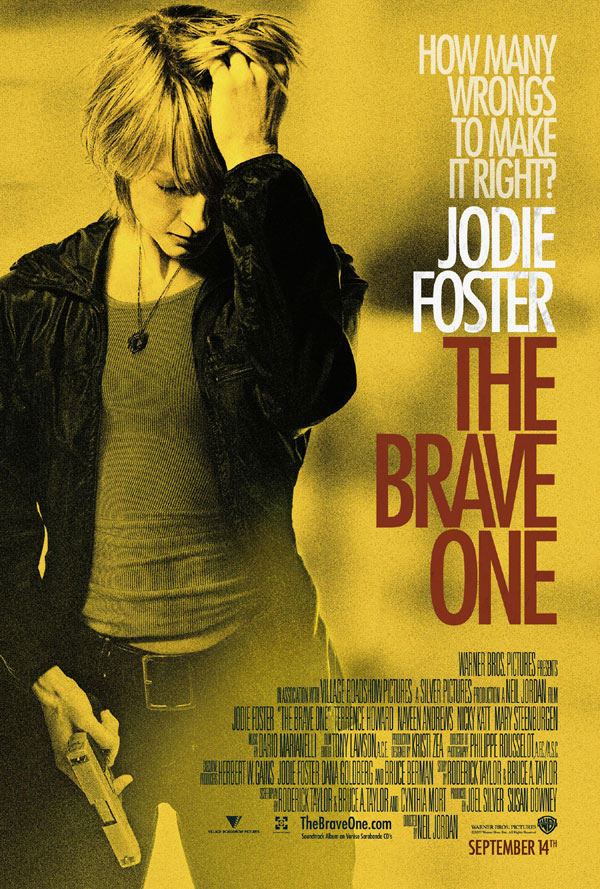 The poster doesn't show a Charlie Bronson-type bad ass with a gun, or a cold-blooded killer,
The poster doesn't show a Charlie Bronson-type bad ass with a gun, or a cold-blooded killer,
but rather a woman with her head in her hands. Not much of a vigilante to be seen.
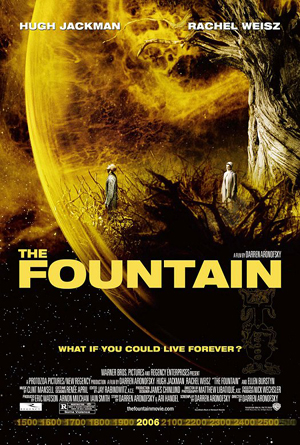 Convergence.
Convergence.
Three stories converge, overlapping in time and space. Two lives, intersected, converge into one most unexpected. A man's fears and desires converge in one moment. Life and death become one. Love means letting go. Eternity is finality in repetition.
This is a description which would never make the back of a DVD box. Its a summation that, while thematically accurate, is merely the surface of the layered cake. That cake is bittersweet, with a story both tragic and inspiring, an ending both painful and beautiful, a meaning both literal and metaphorical. That cake is The Fountain by Darren Aronofsky. The name Aronofsky may not be familiar to you, unless you are a seeker of deeper fictions. He is most well known for his 1998 film π (Pi) or his more recent Requiem For a Dream (2000). It would be six years before he released his next film and to little acclaim. The Fountain, sadly, was not widely accepted and labeled "a pretentious, unfocused, and fussy mess" and "an artsy-fartsy disaster." One reviewer went so far as to compare it to Zardoz, a 1974 b-rated sci-fi catastrophe with Sean Connery, which does more for resurrecting the themes of The Time Machine than comes anywhere near touching The Fountain and leading me to wonder if the critic and I watched the same movie. All of Aronofsky's films are heavily laden with meaning. He's not a fluff-filmmaker. If you want fluff pick up a Nora Ephron film. Not to say her films aren't good, but you can watch them half asleep and still keep up. Aronofsky is aiming for something requiring full-consciousness and perhaps even a step beyond that.
π (Pi) analyzed man's pursuit of God, those who seek to understand the universe out of a desire for understanding and those who are filled with hubris and charge forward wanting only to control. Requiem For a Dream, however, explored the abysmal black of the human soul and the nature of addiction. The Fountain steps outward, out into realms that exist outside the human condition, outside the very shell of humanity to something far more universal: The nature of life and death.
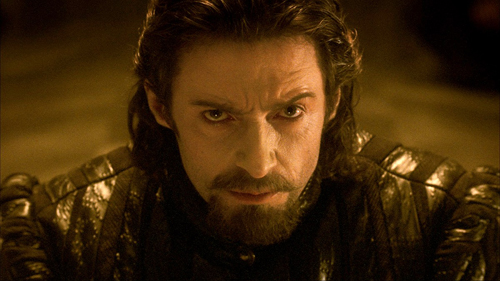 Each of these three films has a common theme: Obsession. π (Pi) is a man's obsession over knowledge, over the key to unlocking the mysterious of the universe written indelibly in the codex of mathematics-that which some call God. Requiem For a Dream is not just about the obsessions of addiction, but the obsessive nature of mankind's desires- the lengths it will take us in depravity in an attempt to obtain an unattainable, intangible 'something better.' Without question, The Fountain is man's obsessive quest for eternal life. What makes the ultimate story of the Fountain stand apart is the conclusion that Aronofsky finally offers up; one so simplistic and innocent in its formation that we should be stunned to have not grasped it before that moment. To those critics who proclaimed this film 'melodramatic', 'pretentious', 'snidely pseudo-spiritual', and 'too flawed to be more than film-cuttings for music videos' I can only shake my head and sigh, though I think that Artist and Filmmaker Julian Schnabel sums my feelings well when replying to Sydney Pollack in Sketches of Frank Gehry (2005):
Each of these three films has a common theme: Obsession. π (Pi) is a man's obsession over knowledge, over the key to unlocking the mysterious of the universe written indelibly in the codex of mathematics-that which some call God. Requiem For a Dream is not just about the obsessions of addiction, but the obsessive nature of mankind's desires- the lengths it will take us in depravity in an attempt to obtain an unattainable, intangible 'something better.' Without question, The Fountain is man's obsessive quest for eternal life. What makes the ultimate story of the Fountain stand apart is the conclusion that Aronofsky finally offers up; one so simplistic and innocent in its formation that we should be stunned to have not grasped it before that moment. To those critics who proclaimed this film 'melodramatic', 'pretentious', 'snidely pseudo-spiritual', and 'too flawed to be more than film-cuttings for music videos' I can only shake my head and sigh, though I think that Artist and Filmmaker Julian Schnabel sums my feelings well when replying to Sydney Pollack in Sketches of Frank Gehry (2005): "I wouldn't. I wouldn't criticize him. That would be like flies flying around a lion. Its like watching a movie like 'Apocolypse Now' and saying that Robert Duvall is over the top." - Julian Schnabel, on Frank Gehry (architect)
The story of The Fountain is a fairly simple one. A man's wife is dying and he is desperate to save her. The story is then divided into three, one in which Dr. Tom Creo is a doctor researching with monkeys to find a cure for Izzy's brain cancer. The second is Tommy, a man traveling through space in a sphere containing only a dying tree, which he is taking to a dying star. Finally there is Tomas, a conquistador entreated by the Queen of Spain to find the Tree of Life spoken of in Genesis to put an end to the blood shed and all too swift fall of Spain. In truth the conquistador is the hero of Izzi Creo's novel "The Fountain," and Tommy a wonderful parallel to the Mayan story of The First Father, their life-giver. As Dr. Creo struggles to come to terms with his wife's death and she comes to accept her own fate, she helps him to reconcile their connection through her novel and telling him to write the ending. This simple act not only forces him to come to terms with her inevitable death, but helps him to understand the eternal cycle (convergence and repetition) of life and death as she herself has come to understand it. Through it all the star Shebulba awaits her, where a dying star will absorb her dead soul and in turn give forth life.
"For every shadow, no matter how deep is threatened by morning light." ~Izzi Creo
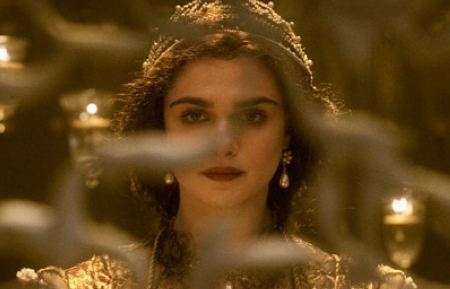 Rachel Weisz, Darren Aronofsky's wife incidentally, gives a wonderful performance as Izzi Creo/Queen Isabel. There is a child-like wonder about her as Izzi begins to understand her existence in a new way. As Isabel she is more sure of herself, her goals. Yet she does not portray this dying woman without fear, without soul-weariness. And beside her, the hero of the story, the Conquistador on so many levels, is Hugh Jackman. He carries himself with the desperation, fear, and soul-consuming love of a husband forced to face the loss of his wife and in doing so, his own mortality. Although each of the three men in these stories faces a slightly different challenge, while ultimately seeking the same end, they are different men. The doctor fights against time to find a cure, allowing his anger and fear to rule him. The conquistador fights against those who would hide the secret to everlasting life from him, as his aim is to succeed for his Queen and win her love. The traveler fights against himself, his own hope and need crippling him as he struggles to conclude his journey to its rightful end.
Rachel Weisz, Darren Aronofsky's wife incidentally, gives a wonderful performance as Izzi Creo/Queen Isabel. There is a child-like wonder about her as Izzi begins to understand her existence in a new way. As Isabel she is more sure of herself, her goals. Yet she does not portray this dying woman without fear, without soul-weariness. And beside her, the hero of the story, the Conquistador on so many levels, is Hugh Jackman. He carries himself with the desperation, fear, and soul-consuming love of a husband forced to face the loss of his wife and in doing so, his own mortality. Although each of the three men in these stories faces a slightly different challenge, while ultimately seeking the same end, they are different men. The doctor fights against time to find a cure, allowing his anger and fear to rule him. The conquistador fights against those who would hide the secret to everlasting life from him, as his aim is to succeed for his Queen and win her love. The traveler fights against himself, his own hope and need crippling him as he struggles to conclude his journey to its rightful end.
Each story, written so movingly, weaves about one another with ease until finally coming to a unified point. Throughout the film there are circles...symbols of eternity as they have no beginning or end, this very idea solidified in the end as each man accomplishes the mission they started, its ending finding success in a fashion true to their goal, but unexpected and contrary to what they believed they wanted, contrary to what they more superficially desired. Izzi: Remember Moses Morales?
Tom: Who?
Izzi: The Mayan guide I told you about.
Tom : From your trip.
Izzi: Yeah. The last night I was with him, he told me about his father, who had died. Well Moses wouldn't believe it.
Tom : Izzi...
Izzi: [embraces Tom] No, no. Listen, listen. He said that if they dug his father's body up, it would be gone. They planted a seed over his grave. The seed became a tree. Moses said his father became a part of that tree. He grew into the wood, into the bloom. And when a sparrow ate the tree's fruit, his father flew with the birds. He said... death was his father's road to awe. That's what he called it. The road to awe. Now, I've been trying to write the last chapter and I haven't been able to get that out of my head!
Tom : Why are you telling me this?
Izzi: I'm not afraid anymore, Tommy.
The circle of life. Nature's Way. The road to awe. Whatever we chose to call it, Eternal life exists but not as man would have it, not as we would suppose it to be. And the reconciliations which must be made when our time of convergence comes is a question of letting go of those perceptions, those misunderstandings, ideas and preconceptions, letting go of that which we would control or possess to understand that we are all part of a whole; a continually flowing fountain which falls only to nourish that which will rise in our place. Darren Aronofsky understands this and through a philosophically stirring film with spiritually stimulating imagery of light he carries his symbolism effortlessly through from start to finish with a fluidity worthy of the film's name.
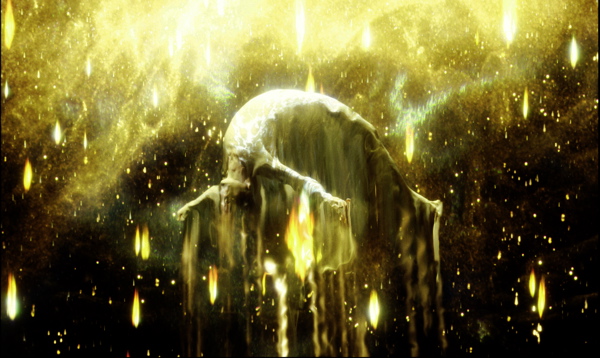
 Don't Cross the road if you can't get out of the kitchen.
Don't Cross the road if you can't get out of the kitchen.
I liked Boondock Saints before it was cool.
Correction: I LOVED Boondock Saints before most people ever heard of it. It's true. There are few things in my life that coincide with what's "cool". This, however, I can safely say I was ahead of the curve. In fact, I may even so boldly make the claim (accurately so) that everyone I know who has seen this film, saw it upon my urging. I found it on a back shelf at a "Ballbuster" video store when they only carried ONE copy. Go there now and there's four or more. It was staring back at me, the brothers, ominously poised with their guns and Willem Dafoe's face hovering in the background. I recognized Sean Patrick Flannery from the "Chronicles of the Young Indian Jones" TV series (yeah...I used to watch it). It was Willem Dafoe, however, that made me pick it up and eagerly read the back for a description. I was instantly intrigued. Less than fifteen minutes into the film, I already KNEW it was going to be one of my modern favorites. A 'cult' favorite if you will.
For those who haven't see the film, let me give you a rough estimation of the story. Two young men, through a random act of violence find themselves compelled to rid their neighborhood of Evil Men. Their breed of vigilante justice has a higher calling as it is God's Work that they believe they are doing, reciting a family prayer over each victim and even blessing their souls once they are dead. They are pursued by an FBI Agent sent in because all of their victims just happened to have hefty dossiers. He is a highly educated, astute detective that cannot wrap his mind about the motives of the killers and finds himself envying them as they, in effect, rid the streets of the very men he has pursued for years but been unable to put away because of legal bureaucracy. "You know, you Irish cops are perking up. That's two sound theories in oneday, neither of which deal with abnormally sized men. Kind of makes me feel like Riverdancing." - Agent Paul Smecker, who then dances a jig with a smile
For a bare bones explanation that will do, because the details make it so much more interesting - and unique. Each character is so real and alive, none of them fit a stereotypical persona at all. On the surface, perhaps, you see Russian mobsters, the mysterious cut-throat assassin, three dumb Irish cops...but each character fills out so much more than those cookie-cutter rolls. For example, our super-FBI Agent Agent Smecker listens to Opera on his CD walkman (that was before the iPod, children) while examining his crime scenes, dances to it openly as he thinks and is a not so closet homosexual with a hatred for "fags," not a self-hating homosexual, mind you, but a "Real Man" that dislikes the effeminate nature of some gay men; not the kind of characterization that you find in most action/dramas. He's intelligent, and knows it, often smugly mocking the amateurish mistakes of Boston's Best. When he fails to connect all the dots, however, he falls to dramatics like temper tantrums and all-out hissy fits in public - outraged at feeling outwitted. This character of Paul Smecker is truly our narrator. The story is mostly propelled from his point of view as he tries to find these vigilantes and reconcile his feelings of admiration with his sworn duties to the law. "I put evil men behind bars, but the law has miles of red tape and loopholes for these cocksuckers to slip through." -Agent Smecker, Drunk in church confession
The MacManus brothers, Connor and Murphy never seem to question the validity of their choice to kill. They are holy men by nature, devout and god fearing, attending early mass everyday before going to work at a meat-packing plant. They speak English, Russian, Italian, French, and being catholic, it is possible, Latin as well. They both are exceptional marksmen, just happen to know IRA arms dealers, and have a friend with connections to the very Russian mob that they are killing. Oh...and their father is Il Duce. The Duke. The most revered and feared hitman in Boston history, hired by the mob when it was other mobsters that needed to be killed. The family tradition seems to be the killing of 'Evil Men,' as well as a family prayer which brings to mind the angels of death, a reference made by the father of the brothers MacManus. "Never shall innocent blood be shed, yet the blood of the wicked shall flow like a river. The Three shall spread their blackened wings and be the vengeful striking hammer of God." -Il Duce
And shepherds we shall be, for thee my Lord for thee, Power hath descended forth from thy hand, that our feet may swiftly carry out thy command, we shall flow a river forth to thee, and teeming with souls shall it ever be. In nomine patris, et filii... [they cock their guns] ...et spiritus sancti." - the brothers MacManus
An interesting technique employed by Troy Duffy, sadly a never-to-be-heard-from-again-debut director, are the news segments interspersed throughout the film to transition as well as the 'Man on the street" interviews that run during the credits asking people what they think of the vigilante killers dubbed "The Boondock Saints." They seem to be fairly genuine reactions that one would encounter on a subject as controversial as vigilante-justice. As a writer and director, Duffy shows a wonderful ability to capture people - real ordinary people in situations not so ordinary. The three Boston cops assisting with Agent Smecker's investigation are men one would not be surprised to encounter working the police department. Det. Greenly, a young, cocky detective whose enthusiasm for the job greatly overshadows any actual ability he has and only seems to highlight his lack of observation and basic logic. Det. Dolly, an older detective whose lost interest in his work,is street smart but not book smart, and is equally intimidated by Smecker's intelligence as he is the man's homosexuality. And Det. Duffy, who could be so much more than he is, but he's grown comfortable being more than the other two with ease, so does not strive to do better. All easily identifiable people, but in no way stereotypical. Agt. Smecker: [walking through the hotel room] How many bodies, Greenly?
Det. Greenly: Eight.
[Smecker gives him a look]
Det. Greenly: Ah, shit! I forgot about that one! Nine! Nine?
Agt. Smecker: While Greenly's out gettin' coffee, anybody else want anything?
Det. Greenly: Shit.
The relationship that the Brothers have with 'Rocco' (interestingly played by David Della Rocco) not only enables them to commit their crimes of justice, but also hinders them in the act. While Rocco, "The Funny Man", is known for his wonderful sense of humor and witty jokes, he is also often the butt of those jokes due to his uneducated,trusting and sometimes belligerent manner. He's 'just one of the guys,' only he's pushing 45 and they are barely 30. He has a junkie girlfriend that takes advantage of him, works for a mob boss that still has him running packages (traditionally a kids' job), and is mocked by kids young enough he could have fathered them. Seeing the route that Connor and Murphy have gone, he misunderstands the directive behind it and follows suit committing a crime of passion as he outlets his anger and hatred for being mistreated for so many years. He's the loser that everyone knows, and pities. And it is Murphy's pity for him that nearly gets he and Connor killed. Rocco: Don't shoot, don't shoot. We're on the same side. Boss must've sent me in as backup. I'm Rocco! I'm the funny man. That ain't my name. [His name tag says Jaffar]
Murphy: Where's your gun? Where's your gun!?
Rocco: I'm the fuckin' funny man! It's right here. Right here. That ain't my real name.
Connor: What the fuck? Jeez! [to Murphy] It's a fuckin' six-shooter!
Murphy: there's nine bodies, genius! What the fuck were you gonna do, laugh the last three to death, funny man?
The villains of the story, while given their own individual quirks, are almost immaterial. They are painted as bad men, and no one need question that fact. The mob boss is racist and kills people. His henchman is played by Ron Jeremy...imagine what you will from there (and yes...there is a masturbation scene, though blissfully we see NOTHING). His cronies are large, violent men that would hurt an old man with Tourette's Syndrome and a stutter. They are not stereotypical in only the sense that they are shown in their less scary moments, but regardless they are unquestioningly Bad Men. Troy Duffy makes an interesting point in the film, whether deliberately or not, that while society on a whole can agree whole-heartedly upon what makes men evil...we cannot agree on what justice is and therefore, if what these men do is right, or if they to are evil - even if they do no harm to innocents. This is the very question that plagues our narrator, Agent Smecker....the question that unsettles his well kept persona...and drives him to seek God's guidance for the first time ever.
Are Connor and Murphy doing God's work, or merely justifying homicide? When does the Justice System fail to do justice? When do good men cease to be good: through acts of vengeance, or acts of indifference?
So I leave you with the opening of the film, and irony which is more than symbollic in itself.
[the brothers rise from their pews and boldly walk past the Monsignor as he preaches to kiss the feet of Christ on the cross]
Monsignor: [as he sees them] And I am reminded, on this holy day, of the sad story of Kitty Genovese. As you all may remember, a long time ago, almost thirty years ago, this poor soul cried out for help time and time again, but no person answered her calls. Though many saw, no one so much as called the police. They all just watched as Kitty was being stabbed to death in broad daylight. They watched as her assailant walked away. Now, we must all fear evil men. But there is another kind of evil which we must fear most, and that is the indifference of good men.
Connor: [as the brothers exit the church] I do believe the monsignor's finally got the point.
Murphy: Aye
 While most would answer "FRENCH!" if asked Ms. 'Toinette's nationality, she was actually born of Austrian blood and married into French court at the age of fourteen. Yes, one...four.....fourteen. Her groom was then sixteen year old Dauphin Louis Auguste (Later to be King Louis XVI) who would fail to consummate their marriage for SEVEN years. What does a teenage girl whose husband is sexually repressed but abundantly wealthy do? She shops. She gambles. She has parties and she flirts. She indulges herself in whatever she can while balancing a disdain for the gossipy French court (not exclusively a French behavior folks...) and maintaining public popularity for herself and, as a result, Austria as a whole. And although she bucks tradition and social expectation, for a good many years this punk-rock girl still manages to stay favorably in the public eye.
While most would answer "FRENCH!" if asked Ms. 'Toinette's nationality, she was actually born of Austrian blood and married into French court at the age of fourteen. Yes, one...four.....fourteen. Her groom was then sixteen year old Dauphin Louis Auguste (Later to be King Louis XVI) who would fail to consummate their marriage for SEVEN years. What does a teenage girl whose husband is sexually repressed but abundantly wealthy do? She shops. She gambles. She has parties and she flirts. She indulges herself in whatever she can while balancing a disdain for the gossipy French court (not exclusively a French behavior folks...) and maintaining public popularity for herself and, as a result, Austria as a whole. And although she bucks tradition and social expectation, for a good many years this punk-rock girl still manages to stay favorably in the public eye. This summary only scratches the surface of a wildly complex woman with a rather scandalous life. Wikipedia manages to delve even deeper. So why then, does a film that uses modern rock music, a movie poster far too reminiscent of a sex pistols album cover, and sporting an American actress not even attempting an Austrian accent fail so MISERABLY at truly conveying just who this young Queen was both in court and in private? It truly plays out as if a better title would have been The Virgin Suicide: 1793.
This summary only scratches the surface of a wildly complex woman with a rather scandalous life. Wikipedia manages to delve even deeper. So why then, does a film that uses modern rock music, a movie poster far too reminiscent of a sex pistols album cover, and sporting an American actress not even attempting an Austrian accent fail so MISERABLY at truly conveying just who this young Queen was both in court and in private? It truly plays out as if a better title would have been The Virgin Suicide: 1793. Rock n'roll?? The intensity of this film is more like listening to an old radio that only intermittently picks up a Top 40 Pop station and starts every day with an hour of white noise. This is no critique of the music selections, although those too were lacking. I speak of the passion, the energy, the sense of abandon and rebellion. While the cold handling of Marie's ingress to not only French life and married life, but the socially challenging politics of the French Court, would have been over-all considered well-done if there was a progressive build of tension which crescendo at some greatly dramatic denouement. What follows instead is a watered down, self-indulgent, wistful play-then-pout session that ultimately lacks the dramatic fire of such a rebellious woman, and pales in scandal to even the weakest of soap operas. The aforementioned Wikipedia article is a more exciting read than this film and wasted far less of my time while giving the added benefit of easy to follow character names. Other than Marie, Louis and the oh-so-sexy Count Ferson, my viewing partner and I resorted to referring to characters by their traits. The red-head chick. The gay guy. The Ambassador of Mercy guy. The King's whore. Etcetera.
Rock n'roll?? The intensity of this film is more like listening to an old radio that only intermittently picks up a Top 40 Pop station and starts every day with an hour of white noise. This is no critique of the music selections, although those too were lacking. I speak of the passion, the energy, the sense of abandon and rebellion. While the cold handling of Marie's ingress to not only French life and married life, but the socially challenging politics of the French Court, would have been over-all considered well-done if there was a progressive build of tension which crescendo at some greatly dramatic denouement. What follows instead is a watered down, self-indulgent, wistful play-then-pout session that ultimately lacks the dramatic fire of such a rebellious woman, and pales in scandal to even the weakest of soap operas. The aforementioned Wikipedia article is a more exciting read than this film and wasted far less of my time while giving the added benefit of easy to follow character names. Other than Marie, Louis and the oh-so-sexy Count Ferson, my viewing partner and I resorted to referring to characters by their traits. The red-head chick. The gay guy. The Ambassador of Mercy guy. The King's whore. Etcetera. The lack of character identification is a key indication of the lack-lustre performances of the cast. How one could collect such a brilliant group of people and fail to succeed is a mystery. Kirsten Dunst has only a handful of scenes in which she truly shines, most of which when she is NOT speaking. Danny Houston's appearances are sparse and far too brief. Rip Torn, Jason Schwartzman, Asia Argento, and an almost awkward insertion of Molly Shannon all fall short of inspiration. With such talented people, the question falls to material, direction or simply waning interest? Indeed, about the only emotion that Kirsten Dunst brings across quite clearly is deep frustration.
The lack of character identification is a key indication of the lack-lustre performances of the cast. How one could collect such a brilliant group of people and fail to succeed is a mystery. Kirsten Dunst has only a handful of scenes in which she truly shines, most of which when she is NOT speaking. Danny Houston's appearances are sparse and far too brief. Rip Torn, Jason Schwartzman, Asia Argento, and an almost awkward insertion of Molly Shannon all fall short of inspiration. With such talented people, the question falls to material, direction or simply waning interest? Indeed, about the only emotion that Kirsten Dunst brings across quite clearly is deep frustration. While I try to commit myself to any film I watch, seeing it through to the end just as one would look at every corner of a painting before deciding it was crap...I admittedly only continued to watch this film for the sake of my viewing partner who had far more interest than I...and because I really wanted to see some fucking blood and a head roll by the end of the movie. It would have at least vindicated some of the two-hours spent gaping at the poorly researched presentation of a historical figure's life in the cinematic equivalent of paper dolls. No one in this film struck me as a three-dimensional human....just pretty paper dolls dressed up as the roles of a little girl's fantasy in which no one understands her, no one loves her, and she just wants to have fun. If written by a 15 year old, this film may seem insightful and mature. For a thirty-six year old writer and director, however, it is self-indulgent and vapid.
While I try to commit myself to any film I watch, seeing it through to the end just as one would look at every corner of a painting before deciding it was crap...I admittedly only continued to watch this film for the sake of my viewing partner who had far more interest than I...and because I really wanted to see some fucking blood and a head roll by the end of the movie. It would have at least vindicated some of the two-hours spent gaping at the poorly researched presentation of a historical figure's life in the cinematic equivalent of paper dolls. No one in this film struck me as a three-dimensional human....just pretty paper dolls dressed up as the roles of a little girl's fantasy in which no one understands her, no one loves her, and she just wants to have fun. If written by a 15 year old, this film may seem insightful and mature. For a thirty-six year old writer and director, however, it is self-indulgent and vapid.
















